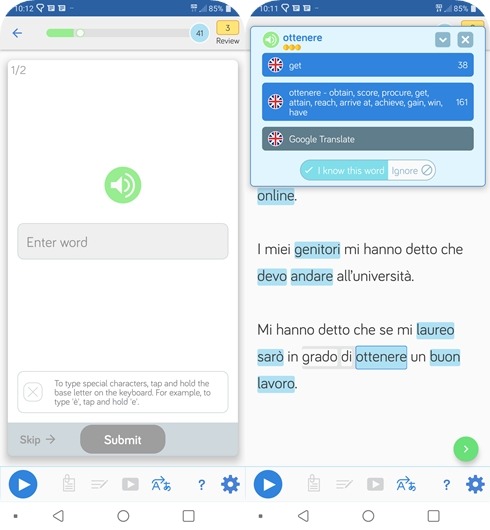The Italian Accent and its Variations Across the Country
What is the Italian accent? It’s really difficult to say. Speakers of the language can sound different in a variety of ways, depending on where in the country they come from. What’s more, the differences can be related to pronunciation but they can always mean that someone actually uses a regional dialect. One thing is certain – Italy is a very rich country in terms of its linguistic heritage.
Standard Italian Accent
As an English language speaker you’ve probably heard about received pronunciation (RP). The posh way in which some British people speak was for a very long time considered to be the only acceptable accent and only this form of the language would appear on TV. Your expectation may be that something like this is also true for Italian.

As much as there’s no such thing as “the Italian accent”, there’s a notion of some Italian accents being standard. Italian accents spoken in the regions of Tuscany, Umbria, Lazio, Marche and to some extent Rome are referred to by some as standardized. However, because of the history of the country, there was never as much emphasis put on the “correctness” of accent as, for instance, in British society. Italy as a country only became an entity in 1871. Before that numerous small states operated separately with their own rulers, traditions and languages. Linguistic diversity has been simply a part of the Italian reality.
Italian Accent vs Italian Dialect
There’s such a thing as standard Italian in terms of grammar rules and similar. It’s based on Tuscan and more specifically on the Florentine dialect. Initially used only by the upper class, it started to appear in the written form in writings of Dante Alighieri and others. Eventually, it became the official language, standard Italian, and started to take over the public space. At home people still spoke what we know as dialects.

You may be familiar with the word dialect as a variation derived from a language. However, in the Italian context a second meaning applies: a dialect also means language used in a colloquial context as opposed to the one used in public life. Italian dialects have not been derived from Italian. They’re, in fact, languages which separately evolved from Latin.
Even today, when dialects are less widely spoken, some areas have made an effort to have their dialects officially recognized as separate languages. It is important to remember because I often heard especially inexperienced language learners mentioning that they “couldn’t understand a word” of what someone was saying because of their accent. The comprehension issues often have nothing to do with someone’s accent but rather with the fact that they use a dialect. An accent is just someone’s pronunciation of a language.
Accent in Italian and Other Regional Differences
Like in the case of many countries, how Italians sound in their language differs regionally. Native speakers can easily guess which region of the country someone comes from, simply by hearing their accent when they speak. They’re used to people sounding differently to the point that it’s odd if someone speaks with a “clear” Italian accent. A good example is what I heard from an Italian, who when hearing where I come from, remembered the name of a Polish actress notable for her roles in Italian movies. He commented on Katarzyna Smutniak saying that: “Her Italian accent is perfect but it baffles me a bit that I can’t guess where she comes from.”

Perhaps it’s not a surprising comment from someone to whom linguistic diversity is just a part of everyday life. Italian accents are extremely diverse. There are major differences on regional level but even people living in relatively close geographical proximity of one another may pronounce things in very different ways. If you don’t decide to live for a long time in Italy, you may never become aware of many nuanced differences between accents, which are evident to someone who has grown up or spent most of his or her life in the country.
The fact that you don’t live in the country and you may be learning abroad can actually cause you some difficulties. Not all Italian accents, for example, are equally easy to understand for a language learner. What’s more, the problems with understanding often have to do with much more than just pronunciation.
There are other regional differences in the Italian language, which are related to words, expressions and grammar. For instance, one of the two main past tenses in Italian is passato prossimo. It’s used in formal and informal writing and speech. Only in literature it’s often replaced with a different tense, passato remoto. Passato remoto is considered by many Italian students an absolute nightmare to learn but fortunately many learners manage to get away with just the passive knowledge of the tense. It becomes a problem only in some circumstances – in some parts of Italy passato remoto is preferred over passato prossimo.
Learning Italian Accents
To speak Italian well and communicate effectively, you should be able to understand different Italian accents. The easiest way to learn this skill is by travelling around Italy or living in the country. You can also make an effort to try to meet Italians in your area to practice the language with. If none of this is possible, you can always opt for listening exposure. Find an Italian podcast about something that interests you, look for Italian interviews on YouTube or listen to the news. Another good option is to watch Italian movies or documentaries.
With enough practice you’ll familiarize yourself with the pronunciation diversity and comprehend all of what people say regardless of their accent.

In terms of whether you should try to make yourself sound like a real Italian or not, the choice is up to you.
A good tip for speaking is to always read text out loud so your pronunciation of particular words improves and should be easily understood by people you talk to. Apart from that it’s also important to work on the way in which you stress words in a sentence. However, you might be better off focusing on the actual vocabulary and popular sayings first before drilling down on your accent.
The linguistic diversity of Italy related to the country’s history is a fascinating matter. It’s interesting to learn about different accents and other linguistic varieties. This doesn’t mean that this diversity isn’t a challenge for the learner. Different Italian accents may initially make an Italian learning journey a bit rocky but as they say “Smooth seas don’t make good sailors”.
Learn Italian on LingQ
Speaking of Italian, LingQ has thousands of hours of Italian audio and transcripts to help improve your ability to read, listen, and speak. You can also import online content you are interested in into LingQ and it will automatically create lessons for you. Check out LingQ today to discover the best way to learn Italian from content you love!

***
Magdalena Osiejewicz-Cooper has lived in Bologna and Palermo. Apart from Italian she speaks fluent Polish and French. She is currently self-studying Spanish.
***


